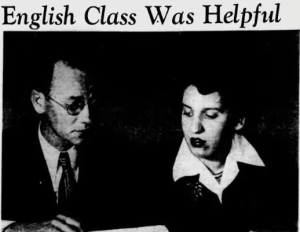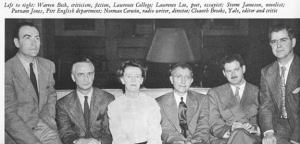The book is called Stoner, by John Williams.
If you have heard of it, good for you. We all should have heard of it but most of us had not until it was proposed several times and finally won the vote.
The protagonist William Stoner grew up a Missouri farm boy. He did not have any advantages of education or wealth, social or class status. His life had hardly begun until, as a young man, he expressed a desire to get a college degree and leave the farm. And I think this does a lot to frame what should be expected of his life.
 His ensuing life of personal victories and defeats, localized and ordinary as they were, were natural to the soil in which he was grown.
His ensuing life of personal victories and defeats, localized and ordinary as they were, were natural to the soil in which he was grown.
Discussion in our meeting went on at some length over whether Stoner was a loser, or whether he was an existential hero in his own context.
He can be admired and loved not because he attained widespread recognition and fame, not because he was a great leader or a victor in battle. But in a narrative sense, he was heroic for his endurance, patience, and his ultimate excellence as a scholar and an educator.
The list of victories and defeats is about even, but they are all personal. It would be unfair to categorize Stoner as one or the other, to label him a “winner” or a “loser” based on any tally of events, because he experienced clear victories and clear defeats.
Stoner endured the vicissitudes of an unremarkable, 20th-century American university professor. I was interested in his life because of the uncanny way that a reader may see his own vicissitudes reflected in Stoner’s life and the inevitability of events. Who did not know, for example, when it first started, that Stoner’s affair with Katherine Driscoll would end in discovery and dissolution?
 Who did not sense, from the stiffness of his courtship with Edith, the dysfunctional nature of Edith’s family and upbringing, and the colossal failure of their wedding night, that the marriage would forever be a liability and a hindrance to Stoner’s career?
Who did not sense, from the stiffness of his courtship with Edith, the dysfunctional nature of Edith’s family and upbringing, and the colossal failure of their wedding night, that the marriage would forever be a liability and a hindrance to Stoner’s career?
And the swiftness and ease with which his rival Hollis Lomax rose to a position over him could not have ended but with some kind of modest vindication and a minor triumph, which it did.
The wreckage of his family, while not a triumph in any sense of the word, did play out sadly and with some closure and schadenfreude with Edith going a little crazy, no longer able to control him, and daughter Grace finding a dark solace in alcoholism and freedom from her mother.
In fact, while I and the rest of our group overall claimed great enjoyment from the book and respect for John Williams’ control with pacing, development, and beauty of language, I can name two issues with the book. I loved the book and think everyone should read it; that doesn’t mean it is impervious to critique.
I loved the book and think everyone should read it; that doesn’t mean it is impervious to critique.
First, as indicated above, the predictability of the outcomes of various relationships and circumstances. While there is a cognitive satisfaction in ‘just deserts’ and suspension and resolve—seeing the craven evildoers repudiated and protagonists upheld—it does leave us intrigue-seekers a little wanting.
I feel a similar way when poorly planned movies do the same thing, and we know in the first 15 minutes where this is going.
It is interesting how inevitability can be satisfying while predictability is usually disappointing. I feel both after reading this book.
The second critique is contained somewhere in the sentiment that I know I will never get around to reading this book a second time.
It does not contain enough to ponder. Maybe that’s a regular feature of realism. There is no action or dialog that left me in thought, feeling a second read would be as rewarding as the first. The wealth of the book is accessible with a single pass through the narrative dream.
Stoner has been described by some critics as “the perfect novel” which is a heady encomium and shouldn’t be leveled lightly. I can agree if what we mean is Williams’ writerly control, his patience, his measurement of every dimension, and his masterful drawing of each character. For these we are thankful to the author. I always want to finish a book with warm feelings toward the author for his or her gift.
But there was lots of telling when we might have wished for showing, a fair number of unsurprising plot trajectories, and no sense that I wanted to “see that movie again.”
I’d say, find another way to praise the book than “the perfect novel.” I prefer, “the best book you’ve never heard of.”








 His ensuing life of personal victories and defeats, localized and ordinary as they were, were natural to the soil in which he was grown.
His ensuing life of personal victories and defeats, localized and ordinary as they were, were natural to the soil in which he was grown. Who did not sense, from the stiffness of his courtship with Edith, the dysfunctional nature of Edith’s family and upbringing, and the colossal failure of their wedding night, that the marriage would forever be a liability and a hindrance to Stoner’s career?
Who did not sense, from the stiffness of his courtship with Edith, the dysfunctional nature of Edith’s family and upbringing, and the colossal failure of their wedding night, that the marriage would forever be a liability and a hindrance to Stoner’s career? I loved the book and think everyone should read it; that doesn’t mean it is impervious to critique.
I loved the book and think everyone should read it; that doesn’t mean it is impervious to critique.
 We began with 45 minutes of toasts—to Athenaeum, to each other, to literature, to the solemn joy and honor to be counted among such an august body doing with such pleasure what so few do, a practice largely lost and forgotten by the modern world.
We began with 45 minutes of toasts—to Athenaeum, to each other, to literature, to the solemn joy and honor to be counted among such an august body doing with such pleasure what so few do, a practice largely lost and forgotten by the modern world. I mentioned drink, as it should not go without comment, that our host provided a bottle of excellently smooth
I mentioned drink, as it should not go without comment, that our host provided a bottle of excellently smooth 





 Emma had it all and lost it all, a female Icarus donning untested wings, lusting for the sun. Or, was she a cork bobbing on the sea of humanity? Was she merely a languid housewife dreaming of the romantic lives of the wealthy? Could her only sin have remained mere covetousness before forces of lust, avarice, and overweening nostalgia lured the little bird from her cage?
Emma had it all and lost it all, a female Icarus donning untested wings, lusting for the sun. Or, was she a cork bobbing on the sea of humanity? Was she merely a languid housewife dreaming of the romantic lives of the wealthy? Could her only sin have remained mere covetousness before forces of lust, avarice, and overweening nostalgia lured the little bird from her cage? “What is Flaubert’s message? What is he trying to tell us? Is there even a message? Or is he just dragging us through a moral quagmire, in effect mocking his readers by filling their heads with illicit thoughts? Does Flaubert harbor some disdain in his heart for the church? the government? the rich? the poor? for all humanity?”
“What is Flaubert’s message? What is he trying to tell us? Is there even a message? Or is he just dragging us through a moral quagmire, in effect mocking his readers by filling their heads with illicit thoughts? Does Flaubert harbor some disdain in his heart for the church? the government? the rich? the poor? for all humanity?”





